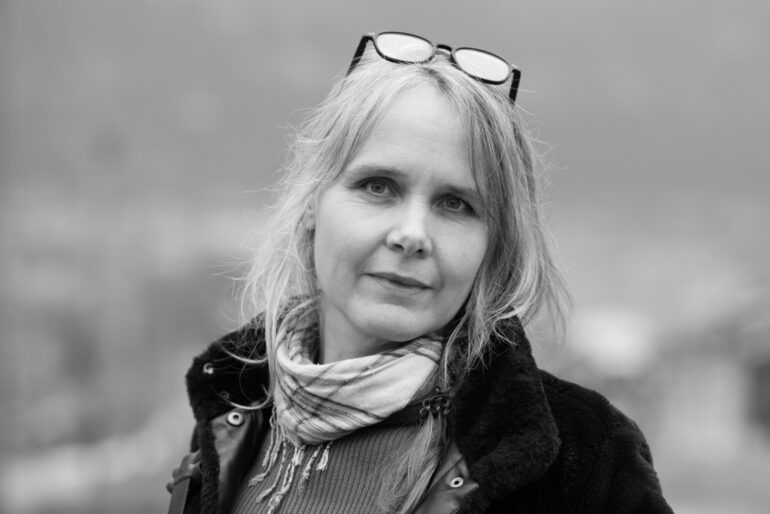WRITTEN BY: Annika Pham
In our series of interviews post-Nordisk Panorama Town Hall, Norwegian documentary producer Skaret talks social responsibility, trust and transparency in the digital age.
One of the co-founders of Stray Dogs in Norway, Skaret has a strong interest in free speech and human rights issues, and “a big heart for stray dogs and hybrids of all kinds” she says.
Skaret is also representing her fellow documentary film producers at Produsentforeningen Virke (Norwegian Producers’ Union)
Among Stray Dogs’ recent productions are Merethe Offerdal Tveit’s Villagers and Vagadonds which won Best Norwegian documentary at BIFF (Bergen) and Stories from the Shower (2021) by Nordic Talents winner Teresia Fant, which scooped the Children's Choice Award at Nordisk Panorama and Best Nordic Documentary at Minimalen Short Film Festival in Trondheim. Their co-production Aswang by Filippino filmmaker Alyx Ayn Arumpac received multiple awards including a FIPRESCI Award at IDFA 2019.
Stray Dogs’ challenging film about rape Not That Kind of Guy by Signe Rosenlund-Hauglid is competing this week for Best Norwegian Documentary at the Bergen International Film Festival.
Skaret spoke to us.
What are the biggest challenges you are facing today and concretely what are you doing to promote documentary filmmaking as an industry and an art form?
KAS: My biggest challenge is time. As a small, two-person production company, working with a number of different directors and projects, we do everything ourselves from development to distribution. It is always a challenge to find time to look ahead. As a producer, I feel an obligation towards the projects and directors I’m working with, and I wish our work could be a little more predictable.
I am a board member of the Norwegian Producer’s Association, always raising my hand on behalf of documentary film, lobbying film institutes, film schools and distribution platforms. Teaching and tutoring are also meaningful tools to promote documentary filmmaking.
Engagement with diverse audiences - wherever they are is more important than ever. What are your recipes to be better in that field?
KAS: I think the most important tool in order to reach diverse audiences is to work with diverse storytellers, providing access to new characters and perspectives. In the making of Stray Dogs films, we also work with impact and outreach to include and engage groups of people for which the film is relevant.
Have you embraced the shift towards streaming and if so how? if not, why?
KAS: Watching a film can open a door to understanding the life and perspective of another human being. Cinema, including festivals, offers a room for sharing and caring, and can bring the feeling of being part of the same society. This room gives us an opportunity to find common ground.
At film festivals, creativity and art are at the forefront. In the world of art, we have the opportunity to explore new and radical thoughts and ideas, challenge established notions and experiment with new perspectives and experiences. This seems not to be as important with commercial streaming platforms.
Documentary film fulfils an important social responsibility in an age where truth and documentation are negotiated in a public space where different agendas and new platforms are constantly emerging, shaping narratives and communication.
I want my films to be available for a wide audience, and I want them to be available to all the taxpayers whose money contributed to financing them, regardless of income, subscriptions and access to cultural institutions.
Balancing the director's artistic freedom with editorial compliance requires large resources and a clear and open collaboration between the platform/broadcaster and producer/director. These resources are unfortunately becoming increasingly limited, with the consequence that the platforms seem to prioritize personal stories and tabloid entertainment, which do not challenge anyone's understanding of status quo, and therefore fail to stimulate debate.
I believe that trust and transparency are key values in the Nordic societies, and the public broadcaster plays an important role in our time of fake news and corporate power. I also believe in the need to confront power, and be strong enough to fight them. If the public broadcaster no longer takes on this task – who will? I'm afraid hunting for clicks in competition with commercial streaming is not the way to go.
What do you feel are the priorities in the Nordics to improve documentary filmmaking towards 2032?
KAS: It seems like it’s going to continue being more and more important for the institutions that we reach an international and/or commercial audience. I wish there would be a bigger focus on developing brave and original storytellers, with diverse perspectives and new insight. We have unique opportunities in the Nordic countries, when it comes to both financing and safety, and we need to rise to the occasion.
Ideally where would you like to be in 2032?
KAS: In my dreams, I am in a position where I have the resources to invest in the development of new projects and talents.
